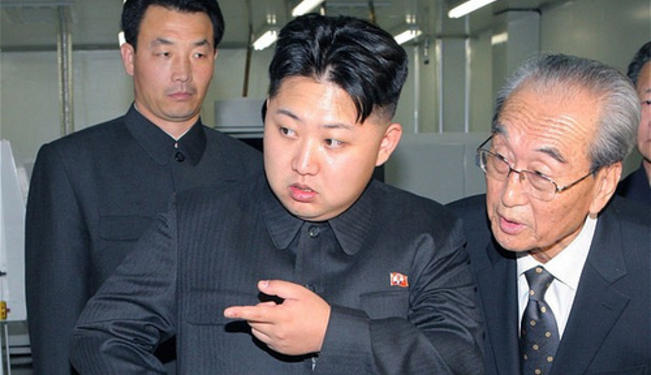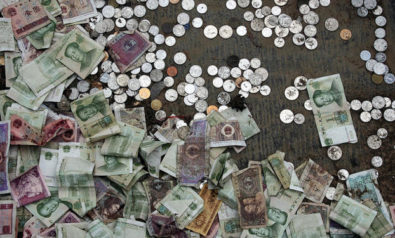Kim Jong Un’s transition to power seems to be going smoothly. This is a boon for both North and South Korea. Following in the footsteps of his recently deceased father, Kim Jong-Il, who in turn inherited power from his father, the god-like Kim Il-sung, Kim Jong Un officially became the supreme leader of North Korea. The clouds of sorrow slowly began to fade and, astonishingly, the transition of power seems to be going smoothly. No uprising generals, no Korean spring, no political turns. The policy of North Korea under Kim Jong Un is the same as under his father. Perhaps this is why the transition is working. The old tenets such as “Military-First” and “North Korea fights capitalism” are proving to be effective in consolidating Kim Jong Un's power. Not least of which, the threat of war against the South of the Korean Peninsula helps to forge alliances behind the scene. In Korean culture age is a crucial factor. That is why it is so important that the very young, new leader of the country consolidates his powers and sets the foundation for his predicted, long reign. The first benchmark will be April 15th, when North Korea celebrates the 100th anniversary of Kim Il Sung's birthday which is considered to be the most important day in North Korea's political year and thus the perfect opportunity, to demonstrate who is in charge of the country. The future will tell whether Kim Jong Un is able to brand his own style of ruling that is distinctive from that of his predecessor. A known fact is that he will rule a country on the brink of collapse, suffering famines and completely dependant on foreign aid to survive. This state of affairs could potentially damage Kim Jong Un’s new rule. The ‘Military-First’ strategy left the economy in tatters and the population in horrible living conditions. The propagandistic announcement to release some political prisoners won't help to remedy the massive human rights violations in the country. Equally miserable is the food security. In the past, North Korea was repeatedly forced to resume the six-party talks in exchange for food aid or give other diplomatic credits for assistance. In 2011 alone, the European Union paid for foreign aid that saved 600,000 North Koreans who would have died otherwise. However, as long as invading capitalism is constructed as a scapegoat for domestic problems, Kim Jong Un's power might be secure and the population may see the big enemy in the United States and not in its own leaders. As long as he instils the militaristic belief of constant external threat into his population’s psyche, and as long as the military feels confident it has the best leader and truly believes Kim Jong Un to be the praised “genie of genies”, as North Korean media like to name him, Kim Jong Un will be able to effectively control his country both in the domestic and the international arena. He certainly needs the help of his uncle and general Jang Song-Thaek in the power transition. However, he will be able to control the military on his own once he consolidated his power. The main challenge will be the balancing of international openness in exchange for foreign aid, with the need to have viable scapegoats. South Korea South Korea’s response, naturally, to Kim Jong-Il’s death was to set its military on alert. South Korean president Lee Myung Bak, still wary after the attacks on Yeongpjeong roughly one year ago, is right to expect a threat of force from the North and, if necessary for Kim Jong Un's purposes, even a bombing of some disputed islands in the Western Sea. Yet, whoever anticipates a great war or even the crossing of the 38° line by a single soldier, is wrong. Neither the North nor the South is interested in military escalation. The North, because the regime knows it is likely to vanish in the aftermath. The South, because it fears the economic costs. Despite the massive military the North wields, its forces are likely to be defeated by a combined South Korean and US army. Yet, there is widespread propaganda both north and south of the 38th parallel that each country are better equipped and prepared to sweep the enemy away. One thing seems certain, however, an open military conflict won't be resolved in a few days and heavy losses would be certain for both sides. It remains questionable whether young Kim Jon Un is able to keep power in a period of military defeats and low morale. He will try to avoid this situation and therefore will abstain from open confrontation. This might open a window to engage more closely in diplomatic dialogues for the North. The South, always uncertain about which policy to pursue, seems to have tried all avenues available. Following the disillusionment of the containment policy in the years leading up to 1990 and the bitter failure of Kim Dae Jung's Sunshine Policy, today's Lee is pursuing a coexistence policy. As such, South Korean foreign policy towards the North is driven by economic rational and hopes to avoid interferences caused by a warmongering North. Therefore, a smooth transition of power as is currently under way is a bull’s-eye for the South Korean government. Critics would call it surrender, proponents realistic. Still, one thing is certain, though. With artillery pointed at Seoul at point blank range, the still young economy and perhaps future power-hub of Asia should act wisely and calmly, so as not to gamble its prospects and the beautiful architecture of Seoul.
The views expressed in this article are the author's own and do not necessarily reflect Fair Observer’s editorial policy.
Support Fair Observer
We rely on your support for our independence, diversity and quality.
For more than 10 years, Fair Observer has been free, fair and independent. No billionaire owns us, no advertisers control us. We are a reader-supported nonprofit. Unlike many other publications, we keep our content free for readers regardless of where they live or whether they can afford to pay. We have no paywalls and no ads.
In the post-truth era of fake news, echo chambers and filter bubbles, we publish a plurality of perspectives from around the world. Anyone can publish with us, but everyone goes through a rigorous editorial process. So, you get fact-checked, well-reasoned content instead of noise.
We publish 2,500+ voices from 90+ countries. We also conduct education and training programs
on subjects ranging from digital media and journalism to writing and critical thinking. This
doesn’t come cheap. Servers, editors, trainers and web developers cost
money.
Please consider supporting us on a regular basis as a recurring donor or a
sustaining member.
Will you support FO’s journalism?
We rely on your support for our independence, diversity and quality.












Comment